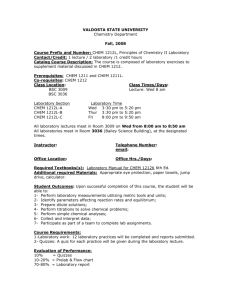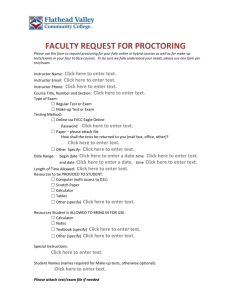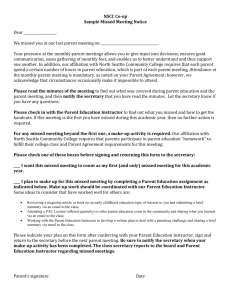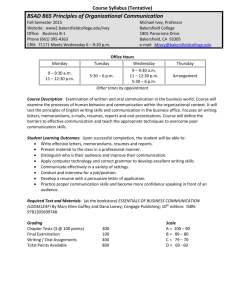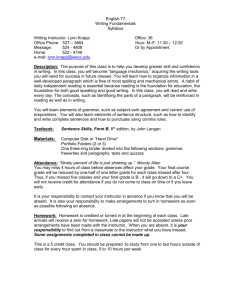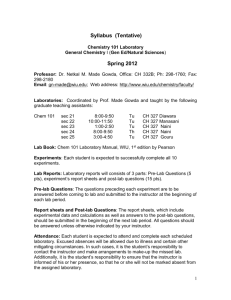CHEM 1212 Laboratory Syllabus
advertisement
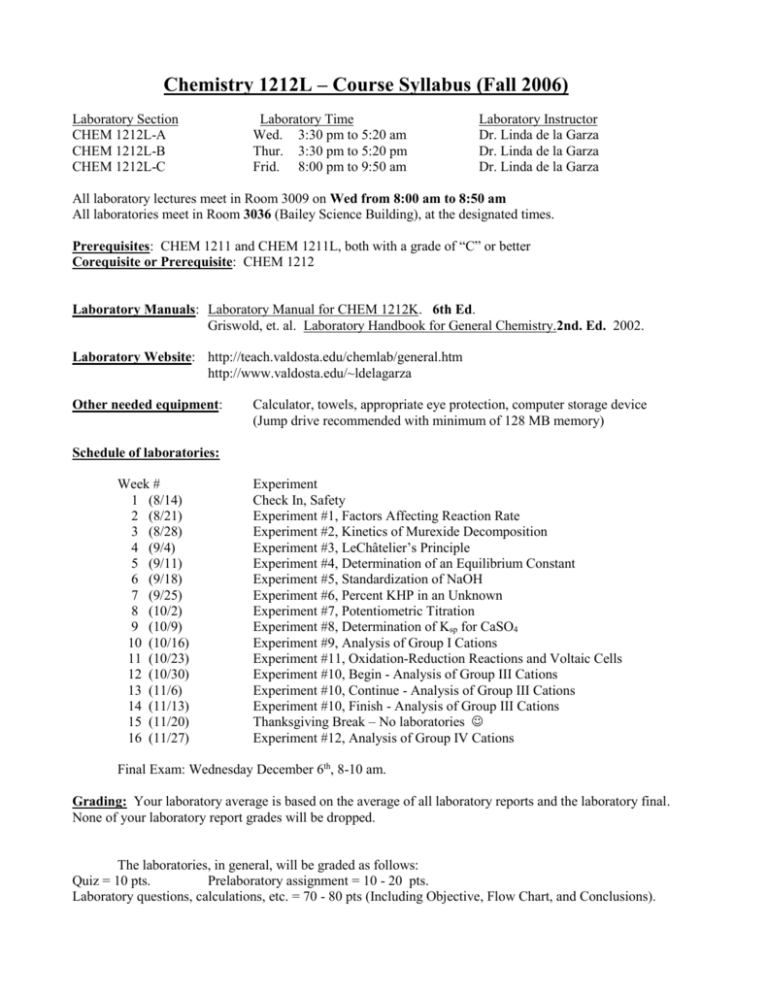
Chemistry 1212L – Course Syllabus (Fall 2006) Laboratory Section CHEM 1212L-A CHEM 1212L-B CHEM 1212L-C Laboratory Time Wed. 3:30 pm to 5:20 am Thur. 3:30 pm to 5:20 pm Frid. 8:00 pm to 9:50 am Laboratory Instructor Dr. Linda de la Garza Dr. Linda de la Garza Dr. Linda de la Garza All laboratory lectures meet in Room 3009 on Wed from 8:00 am to 8:50 am All laboratories meet in Room 3036 (Bailey Science Building), at the designated times. Prerequisites: CHEM 1211 and CHEM 1211L, both with a grade of “C” or better Corequisite or Prerequisite: CHEM 1212 Laboratory Manuals: Laboratory Manual for CHEM 1212K. 6th Ed. Griswold, et. al. Laboratory Handbook for General Chemistry.2nd. Ed. 2002. Laboratory Website: http://teach.valdosta.edu/chemlab/general.htm http://www.valdosta.edu/~ldelagarza Other needed equipment: Calculator, towels, appropriate eye protection, computer storage device (Jump drive recommended with minimum of 128 MB memory) Schedule of laboratories: Week # 1 (8/14) 2 (8/21) 3 (8/28) 4 (9/4) 5 (9/11) 6 (9/18) 7 (9/25) 8 (10/2) 9 (10/9) 10 (10/16) 11 (10/23) 12 (10/30) 13 (11/6) 14 (11/13) 15 (11/20) 16 (11/27) Experiment Check In, Safety Experiment #1, Factors Affecting Reaction Rate Experiment #2, Kinetics of Murexide Decomposition Experiment #3, LeChâtelier’s Principle Experiment #4, Determination of an Equilibrium Constant Experiment #5, Standardization of NaOH Experiment #6, Percent KHP in an Unknown Experiment #7, Potentiometric Titration Experiment #8, Determination of Ksp for CaSO4 Experiment #9, Analysis of Group I Cations Experiment #11, Oxidation-Reduction Reactions and Voltaic Cells Experiment #10, Begin - Analysis of Group III Cations Experiment #10, Continue - Analysis of Group III Cations Experiment #10, Finish - Analysis of Group III Cations Thanksgiving Break – No laboratories Experiment #12, Analysis of Group IV Cations Final Exam: Wednesday December 6th, 8-10 am. Grading: Your laboratory average is based on the average of all laboratory reports and the laboratory final. None of your laboratory report grades will be dropped. The laboratories, in general, will be graded as follows: Quiz = 10 pts. Prelaboratory assignment = 10 - 20 pts. Laboratory questions, calculations, etc. = 70 - 80 pts (Including Objective, Flow Chart, and Conclusions). Letter grades are assigned as follows: A 90.0% and up, B 80.0% to 89.9%, C 70.0% to 79.9%, D 60.0% to 69.9%, F below 60.0% Laboratory Attendance: Laboratory attendance is mandatory. If you have an excused absence, the laboratory must be made up. If a laboratory is not made up, it counts as a missed laboratory. The penalty for your first missed laboratory is a "0" for that laboratory. The penalty for your second missed laboratory is a "0" for that laboratory and a drop in one letter grade for the course (i.e. a "B" becomes a "C"). The third missed laboratory results in failure for the course. Of course, an unexcused absence counts as a missed laboratory, with no chance to make up the laboratory. Laboratory Lecture Attendance: Attendance at the laboratory lecture is mandatory. An absence from the laboratory lecture will result in a "0" for that week's quiz (excused or unexcused). Handing In Laboratory Reports: Laboratory reports are due at the beginning of the laboratory period one week after that laboratory has met, unless otherwise specified by the laboratory instructor. Make-ups: Make-up laboratories are permitted only during the same week in which the experiment is being done. Make-up laboratories at other times are at the discretion of the laboratory instructor. In those cases, it is the responsibility of the laboratory instructor to supervise the make-up. If the laboratory is made up in a different laboratory instructor’s laboratory, the make-up laboratory instructor must sign the report sheet indicating that the make-up was successfully completed. Failure to do this will result in the make up laboratory work not being accepted. No make-up laboratories are permitted after Dec 1st. In order to receive credit for each laboratory you must attend the laboratory, do the laboratory work, and hand in the report. "Dry labbing", which is either not attending the laboratory, and handing in a report, or not doing the laboratory work while handing in the report will NOT be tolerated and a first offense will result in FAILURE FOR THE COURSE. Lateness: If you are more than 15 minutes late to a laboratory, you may not be allowed to do the laboratory at that time. Dropping the course: If you wish to drop the course and/or not attend the laboratory any more, you must officially check out of your laboratory drawer, even if a second person will still be using it. Checking out the drawer involves washing glassware and making sure all glassware and equipment are in the laboratory desk. "Unofficially dropping" and not showing up for laboratory any longer will result in a hold being placed on your records until you check out. Safety: Appropriate eye protection must be worn at all times while in the laboratory. If you are caught without appropriate eye protection, you will be given two warnings. A third offense during the same laboratory period will result in your being asked to leave the laboratory, with a zero for that day's work and no chance to make up the missed work. Access Office Information: Any student who requires classroom accommodations or modifications because of a documented disability should contact the Access office at the beginning of the semester. Their number is 2452498. Chemistry 1212 - Laboratory Summary (Fall 2006) Lab Instructor: Dr. de la Garza (office in room 3080 – third floor of the Bailey Science Building). Phone: 333-5340 e-mail: ldelagarza@valdosta.edu web: www.valdosta.edu/~ldelagarza Students are required to read the complete introduction–explanation for each experiment before lab lecture. A quiz will be given at the end of each lecture. Students are required to complete the pre-labs before the lab period, they are due on the first 5 min. of the laboratory time. Your pre-lab is composed of your fill out pre-lab questions from the manual and a flow-chart of the lab procedures. Students are required to complete their laboratory report during and after the lab experiment. Lab reports are due one week after completion of the experiment during the first 5 min. of the following lab period. Your laboratory report is composed of your fill-out results (with all the calculations written down), the post-lab questions from the manual, AND the following: 1. State the objective of the lab experiment (hypothesis). Ask the questions: Why (am I doing this experiment)? What (do I want to find out)? 2. State the techniques used in the experiment (methods). Ask the question: How (am I going to achieve the objective(s))? - Attach/include flow chart 3. State the findings / conclusions (in summary) of the lab experiment. Analyze your results and ask the question: How the results confirm the hypothesis (or achieve the objectives)? Use the sources available for completion of your reports: start with reviewing the information in your lab manual, use your textbook (or any other chemistry book), and talk to your classmates, and to Dr. de la Garza. If you make less than 70 points on your pre-lab or lab report, you have the option to redo it. Within 3 days, correct what you missed and return it to your instructor (generally, drop it in Dr. de la Garza’s office, CB 3080). Late pre-labs and reports have a 20 points penalty. While in the laboratory: EYE PROTECTION is STRICTLY enforced! Students are responsible for wearing glasses or goggles at all times inside the laboratory. - You will be working with glassware that might break (you don’t want pieces of glass in your eyes). - You will be working with dehydrating liquids (you don’t want strong acid burning your eyes). If the professor has to remind you to wear your goggles, 5 points will be taken off of your lab report. Always have on hand a calculator, a periodic table, and paper towels. You will not be done with your lab work until your working area is CLEAN (including the balances, reagents bench, hoods) and the instructor has approved your laboratory notes.
